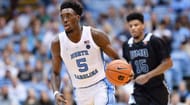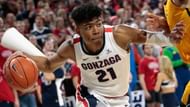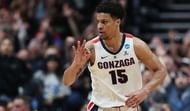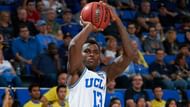College athletes get a ton of media attention, more so now than ever before. Some of these athletes are hyped up by media outlets before they even declare for the draft, leading to unrealistic expectations from fans.
What we tend to forget, though, is that we only see the highlights against college opponents. The NBA is an entirely different kettle of fish; the best players in the world compete here. This causes a lot of players that might not be ready to play in the NBA to be hyped up and leads to draft prospects being unrealistically overrated.
On that note, let us look at the five most overrated prospects in the 2019 NBA Draft.
Explore the NBA Draft 2024 with our free NBA Mock Draft Simulator & be the GM of your favorite NBA team.
#1 Cam Reddish (Projected 8th overall)
Cameron Reddish, a forward for Duke, averaged 13.5 points, 3.7 rebounds, and 1.9 assists a game last year. Reddish's low numbers and inconsistency can be accounted to his sudden change of role from the first option for the small forward position for his team in high school, to being overshadowed by Zion Williamson and RJ Barrett in Duke.
However, his inability to adapt to his role is disappointing, since he obviously will not be the first option for his team in the NBA. Scoring at just 35.6% accuracy from the field, Reddish's outside game is also mediocre with him converting only one-third of his catch-and-shoot chances. Reddish also records 96 turnovers compared to 70 assists, which is a major issue for any player.
His competitiveness is questionable after last season, with him relying on his teammates far too often when unable to generate offense. While his skill somewhat makes up for his lack of athleticism, Reddish still doesn't get up as much as he should with his 7'1 wingspan.
Reddish seems to settle for bad shots after not being able to beat defenders off the dribble, choosing to take a fadeaway or lean-in jumper instead of regaining his balance and exploring other offensive avenues. Unsurprisingly, many have questioned his work ethic as a result.
#2 Nassir Little (Projected 11th overall)

Nassir Little, a forward from North Carolina, averaged 9.8 points, 4.6 rebounds, and 0.7 assists a game. While Little is extremely explosive and has an incredible length with a 7'1 wingspan, he has struggled with consistency throughout his college career.
Little lacks the ability to create offense off the dribble and seems to depend on only his athleticism to score. His offensive moves seem to be predetermined, allowing teams to easily lock him up on defense. His lack of shooting consistency is also a problem - he only shot 27% from three in his freshman year.
Little also tends to be careless with the ball, allowing easy turnovers. His offensive game seems limited to driving past defenders attempting to draw contact or the rare pull-up jumpshot. Nassir also records a 7.1 assist percentage, which is extremely low for a first-round forward. Moreover, his basketball IQ and feel for the game are not top-notch.
Nassir should also look to improve his ball handling and passing ability, which are not at the NBA level right now. He does not present himself as a regular offensive threat with him not being able to break the defense down or create shots for teammates at will. His lack of a mid-range game, turnovers, inability to move off the ball, and predictability present problems for a potential top 15 pick.
#3 Rui Hachimura (Projected 13th overall)

Rui Hachimura, a forward from Gonzaga, averaged 19.7 points, 6.5 rebounds, and 1.5 assists last season. As a 6'8 big man, Hachimura can shoot well at 59% from the field. While he did convert at almost 42% from the three in the 2018-19 season, he averaged only one attempt per game. Thus, he doesn't have many perimeter skills that would let him convert on the offense if he played small forward.
At the college level, Hachimura used his size in the interior to score, which won't be possible in the NBA, with all forwards having a similar, or better build. Hachimura also lacks the explosiveness and speed to get past defenders and needs to become a better passer and ball-handler to contribute at a higher level.
Scouts have noticed that he looks a little lost while playing against better competition, not being able to recognize plays as they develop, and forcing his team out of position by making mistakes. This shows a lack of high basketball IQ, which could definitely present as a problem in the NBA.
Hachimura also shows a tendency to show too much of the ball to defenders while handling possession, allowing it to be easily poked away. On the defensive end, Hachimura does not present much despite his size. He only recorded 50 blocks over his three-year career with Gonzaga and struggles to limit his opponents' scoring.
Overall, while he's a decent option on the offensive end, Hachimura's lack of willingness to shoot the three, a certain lack of explosiveness and speed, and compromising his team on defense will cause many problems for him in the NBA.
#4 Brandon Clarke (Projected 26th overall)

Brandon Clarke, a PF/C from Gonzaga, averaged 16.9 points, 8.6 rebounds, and 1.9 assists last season. Clarke's ability to swat shots during his short college career (3.2 blocks per game in 2018-19 season) made him an interesting option for the draft, however, he lacks length with a 6'8 wingspan.
Offensively, he would need to be placed under the rim to contribute, since he lacks an outside shot. He shot a lackluster 27% from three last season and seems hesitant to shoot unless the opponent leaves him wide open. This could allow the opponent to sag on defense, making it harder for his team to generate an offensive flow.
While Clarke has a good vertical, recording in at 40.5 inches, his smaller wingspan, combined with the fact that he weighs only 207 lbs, will make it difficult for him to contest for rebounds against NBA players.
Scouts noticed Clarke being slightly reckless on defense - his propensity to go for blocks more often than necessary pushes his team out of position, and allows defensive breakdowns.
While Clarke was an excellent defender at the college level, he will likely be bullied on both, defense and offense in the NBA, due to his lack of length and weight in a league filled with taller, stronger centers. He also needs to work on his playmaking ability and his shooting to be a viable offensive option.
#5 Kris Wilkes (Projected 50th overall)

Kris Wilkes, a sophomore from UCLA, averaged 17.4 points, 4.8 rebounds, and 1.7 assists a game in the 2018-19 season. While the numbers look decent, the 6'8 guard is a fairly inconsistent shooter, shooting 33% from the three, and 67% from the free throw line. Wilkes also shows a lack of explosive ability, hence the hope that his shooting numbers would improve in the last season.
Wilkes has issues converting shots off screens or pull-ups, which can be a major issue in today's NBA. Wilkes is also average defensively with the primary incentive for a team to pick him being his size as a guard and the ability to create shots for himself. However, not being able to convert those shots as a guard makes him lose a lot of stock as a draft prospect.
Scouts also noticed a certain aggression in Wilkes' game, and a tendency to not slow things down when required. This causes him to often get called for unnecessary fouls, like charges.
Wilkes has improved his points per game at the college level, but that doesn't take anything away from his lack of consistency. Wilkes, initially expected to be a late first-round pick, has fallen in mock drafts to 50th overall.